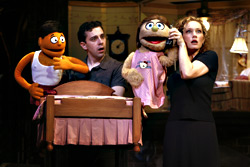Anyone who grew up watching Sesame Street—which must be nearly every American under 45—has more than just the show’s setting and characters permanently inscribed on their brain, we’ve absorbed its very style and method: that entertainingly didactic mix of life lessons, catchy songs, animated graphics, and the casual interaction of humans, animals, and that indiscriminate fuzzy species known as “monsters.” Take that template, age the life lessons a couple decades, and you’ve got Avenue Q, the Tony-winning cult-favorite musical which opened at the Paramount last Tuesday.
With a sidelong glance at the original, Robert Lopez and Jeff Marx made some characters people and others puppets, set them on a dingy urban street, and scattered bouncy tunes over everything. They specifically translated Bert and Ernie (how old are those two, anyway? They act like kids but live alone) into actual adults: the persnickety Rod, the last guy on the block to figure out that he, Rod, is gay, and his slacker roommate Nicky. The only other overt reference to a Sesame Street character is the antisocial Trekkie Monster, addicted to something other than cookies. There’s just enough plot to keep the show from being a revue, but, shrewdly, no more: Princeton, who opens the show with the sprightly number “What Do You Do with a B.A. in English?”, is just out of college and needs some direction; aspiring teacher Kate is ready for a boyfriend.
The lyrics are consistently funny and the melodies effortlessly hooky, so the songs work beyond what might have been one-joke titles: “It Sucks to Be Me,” “Everyone’s a Little Bit Racist,” “The Internet Is for Porn.” Similarly, the whole brilliant show transcends the shock-value premise of seeing googly-eyed felt puppets swear, have sex, and complain about credit-card debt and men unable to commit. That sex scene, by the way, graphic enough that it drove at least one couple to the exits opening night (you might say that today’s episode is brought to you by the letters F and U and the number 69), is not only a hilarious tour-de-force dirty joke but a sweet, even poignant, reminder that everyone looks goofy and cartoonish during sex.
The cast not only has to act, sing, and dance, but manipulate the puppets too—even sometimes trade them off and voice characters other than the ones whose mouths and hands they’re moving—which they did with a seamless, impressive adroitness. I only have two quibbles, both probably inevitable in a show that’s gone from off-Broadway to Broadway to a nine-month run in Vegas to a national tour. First, the production comes off a little over-polished and unspontaneous—laminated, somehow—in a way that seems at odds with the show’s funky, laid-back mood. Second was an elaborately set-up passing-the-hat number, which must have been funny, and financially necessary, back in the Vineyard Theatre on East 15th but which has become surreal and slightly uncomfortable in a show that charges up to $70 a seat.







